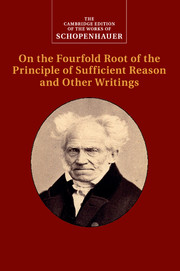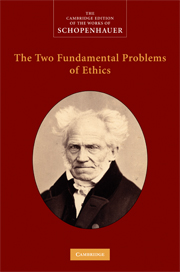Schopenhauer: On the Fourfold Root of the Principle of Sufficient Reason and Other Writings
Part of The Cambridge Edition of the Works of Schopenhauer
- Real Author: Arthur Schopenhauer
- Editors and translators:
- David E. Cartwright, University of Wisconsin, Whitewater
- Edward E. Erdmann, University of Wisconsin, Whitewater
- Christopher Janaway, University of Southampton
- Date Published: June 2013
- availability: This ISBN is for an eBook version which is distributed on our behalf by a third party.
- format: Adobe eBook Reader
- isbn: 9781107109568
Find out more about Cambridge eBooks
Adobe eBook Reader
Other available formats:
Hardback, Paperback
Looking for an inspection copy?
This title is not currently available on inspection
-
This volume of translations unites three shorter works by Arthur Schopenhauer that expand on themes from his book The World as Will and Representation. In On the Fourfold Root he takes the principle of sufficient reason, which states that nothing is without a reason why it is, and shows how it covers different forms of explanation or ground that previous philosophers have tended to confuse. Schopenhauer regarded this study, which he first wrote as his doctoral dissertation, as an essential preliminary to The World as Will. On Will in Nature examines contemporary scientific findings in search of corroboration of his thesis that processes in nature are all a species of striving towards ends; and On Vision and Colours defends an anti-Newtonian account of colour perception influenced by Goethe's famous colour theory. This is the first English edition to provide extensive editorial notes on the different published versions of these works.
Read more- These essays reveal Schopenhauer's controversial views on science, explanation and the essence of nature
- The first English translation to provide thorough scholarly notes on the differences between editions
- The volume includes a substantial introduction to all three works
Reviews & endorsements
'This new translation of three of Schopenhauer's essays is of a very high quality and is testament to the customary rigor of the Cambridge Translations. Undoubtedly, this new edition will become in time the standard work of reference for English-speaking scholars worldwide.' Philosophischer Literaturanzeiger
Customer reviews
Not yet reviewed
Be the first to review
Review was not posted due to profanity
×Product details
- Date Published: June 2013
- format: Adobe eBook Reader
- isbn: 9781107109568
- contains: 8 b/w illus.
- availability: This ISBN is for an eBook version which is distributed on our behalf by a third party.
Table of Contents
General editor's preface
Editorial notes and references
Introduction
Notes on text and translation
Chronology
Bibliography
Part I. On the Fourfold Root of the Principle of Sufficient Reason:
1. Introduction
2. Survey of what is most important in previous teachings about the principle of sufficient reason
3. Inadequacy of previous accounts and sketch of a new one
4. On the first class of objects for the subject and the form of the principle of sufficient reason governing in it
5. On the second class of objects for the subject and the form of the principle of sufficient reason governing in it
6. On the third class of objects for the subject and the form of the principle of sufficient reason governing in it
7. On the fourth class of objects for the subject and the form of the principle of sufficient reason governing in it
8. General remarks and results
Variants in different editions
Collation of the two editions
Part II. On Vision and Colours:
9. On vision
10. On colours
Variants in different editions
Part III. On Will in Nature:
11. Introduction
12. Physiology and pathology
13. Comparative anatomy
14. Plant physiology
15. Physical astronomy
16. Linguistics
17. Animal magnetism and magic
18. Sinology
Reference to ethics
Conclusion
Variants in different editions
Glossary of names
Index.
Sorry, this resource is locked
Please register or sign in to request access. If you are having problems accessing these resources please email [email protected]
Register Sign in» Proceed
You are now leaving the Cambridge University Press website. Your eBook purchase and download will be completed by our partner www.ebooks.com. Please see the permission section of the www.ebooks.com catalogue page for details of the print & copy limits on our eBooks.
Continue ×Are you sure you want to delete your account?
This cannot be undone.
Thank you for your feedback which will help us improve our service.
If you requested a response, we will make sure to get back to you shortly.
×



